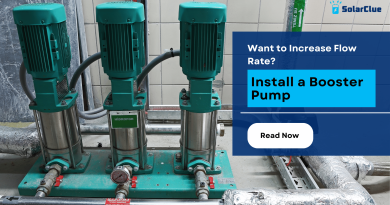Ways of Climate Change Prevention – Install a Heat Pump
Climate change prevention is the need of the hour. Climate change is one of the biggest threats facing our planet today. As individuals, it’s crucial for us to take steps to reduce our carbon footprint and mitigate the effects of climate change. One of the biggest contributing factor to increased level of carbon footprint are the devices we use at our homes.
In this blog, we will discuss the ways an individual can contribute to the prevention of climate change. Let’s get started.
Table of Contents
Understanding Climate Change
Climate change is primarily caused by the excessive release of greenhouse gases, such as carbon dioxide and methane, into the atmosphere. These gases trap heat from the sun, leading to a gradual increase in global temperatures. The consequences of climate change are far-reaching and severe, including rising sea levels, extreme weather events, and disruptions to ecosystems and agriculture.
Preventing climate change is essential to preserving our planet for future generations. While large-scale efforts are needed from governments and industries, individual actions can also make a significant difference.
Ways to Prevent Climate Change
Governments and industries should take big initiatives to prevent climate change. But how can you as an individual contribute in helping to solve this problem. It can be done by making small changes in our lifestyle. It can done simply by making conscious decisions while purchasing any electric device. The devices that we normally use on a daily basis consume a lot of electricity, which leads to an increase in greenhouse gas emissions.
One effective strategy would be to replace the appliances with energy-efficient alternatives that consume less electricity, thereby reducing greenhouse gas emissions associated with power generation.
Why Reduce Electricity Consumption?
The production of electricity, particularly from fossil fuel sources, has a negative impact on the environment.
1. Air pollution
The burning of fossil fuels such as coal, oil, and natural gas for electricity is very harmful. It releases harmful pollutants like nitrogen oxides, sulfur dioxide, and particulate matter into the air. These pollutants contribute to smog, acid rain, and respiratory issues. That is why it crucial to reduce electricity consumption to minimize air pollution.
2. Water pollution
Power plants require vast amounts of water for cooling purposes, and the discharge of this heated water can harm aquatic life and ecosystems. Additionally, the mining and extraction of fossil fuels can contaminate water sources with toxic substances. This is also why there is a need to reduce electricity demand and shift towards cleaner energy sources.
3. Land degradation
The extraction and transportation of fossil fuels can lead to land disturbances, deforestation, and habitat destruction. Reducing electricity consumption can help mitigate the demand for these activities, thereby protecting natural environments and biodiversity.
4. Greenhouse gas emissions
The burning of fossil fuels for electricity generation is a major source of greenhouse gas emissions, primarily carbon dioxide, which is the primary driver of climate change. Reducing electricity consumption directly translates to lower greenhouse gas emissions, helping to combat global warming and its catastrophic consequences.
Which Device Can Help Reduce Electricity Consumption?

There are so many devices we use in our day to day lives. Most of them consume lot of electricity. On such device is our water heater. Most of us use a geyser to meet our daily hot water needs. But the geyser consumes a lot of electricity. But there are energy efficient options available in the Indian market. It is a Heat Pump.
Heat pump water heaters are an excellent solution for meeting your daily hot water needs while significantly reducing your electricity consumption. Unlike traditional geysers, which rely on resistance heating, heat pump water heaters work by transferring heat from the surrounding air to the water.
The heat pump consists of three main components: an exhaust fan, a compressor, and a storage tank. The exhaust fan draws in air from the surrounding environment, and the compressor compresses and heats this air. The heated air is then passed through a heat exchanger, transferring its heat to the water stored in the tank.
This process is highly efficient, as it requires less energy to transfer heat than to generate it directly through resistance heating. Consequently, heat pump water heaters consume significantly less electricity than traditional geysers, making them an environmentally friendly choice in the long run.
Other Benefits of Heat Pumps
In addition to their energy-saving capabilities, heat pump systems offer several other advantages:
1. Cost-effective
While the initial investment for a heat pump water heater may be higher than a traditional electric geyser, the long-term savings on electricity bills make them a cost-effective choice. Since heat pumps operate by transferring heat from the surrounding air rather than generating it directly, they consume significantly less electricity. This translates to substantial savings on monthly utility bills, allowing the initial cost to be recovered within a few years. Additionally, many regions offer tax credits or rebates for installing energy-efficient appliances like heat pump water heaters, further reducing the overall cost.
2. Long lifespan
Heat pump water heaters are designed to be durable and long-lasting. With proper maintenance, such as regular filter cleaning and periodic inspections, a high-quality heat pump water heater can have a lifespan of 10-15 years, or even longer. This is significantly longer than the average lifespan of a traditional electric geyser, which typically needs replacement after 8-10 years. The longevity of heat pump water heaters contributes to their overall cost-effectiveness, as you won’t need to replace them as frequently, saving you money in the long run.
3. Reduced water wastage
Traditional geysers often require users to let the water run for a while before it becomes hot enough for use, resulting in significant water wastage. Heat pump water heaters, on the other hand, maintain a constant supply of hot water in their well-insulated storage tanks. This means that hot water is readily available whenever you need it, eliminating the need to let the water run and reducing water wastage. This not only saves water, a precious natural resource, but also helps lower your water utility bills.
4. Efficient in cold climates
One common misconception about heat pump water heaters is that they may not perform well in colder climates. However, modern heat pump water heaters are designed to be efficient even in low temperatures. They can effectively extract heat from the surrounding air, even when the temperature drops below freezing. This makes heat pump water heaters a viable and energy-efficient option for hot water needs in various climates, including colder regions.
Conclusion
Addressing climate change requires collective action from individuals, communities, and governments. By making eco-friendly choices in our daily lives, such as installing energy-efficient heat pump water heaters, we can contribute to reducing greenhouse gas emissions and mitigating the effects of climate change. Not only does this help protect our planet, but it also offers practical benefits like lower electricity bills and a more sustainable lifestyle.
Visit SolarClue® to see the best heat pump water heaters. SolarClue® is an online marketplace where solar energy products are sold at discounts up to 50%.




